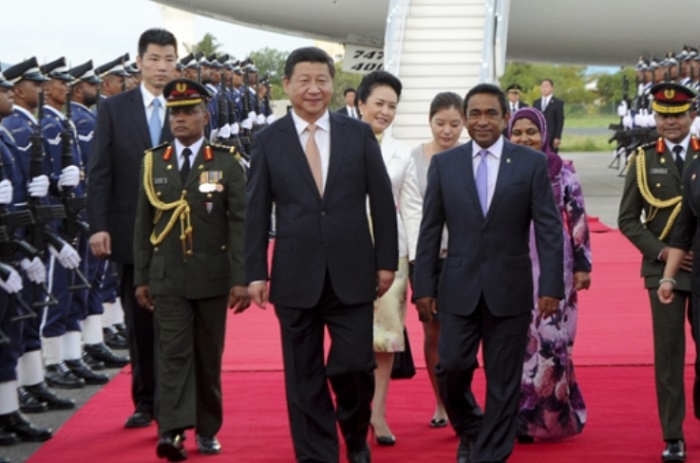
The Maldives, a small island nation in the Indian Ocean, has been a subject of growing political interest for China in the last decade. Political and economic influence is a key aspect of China’s strategy to expand its global footprint, and the Maldives has been no exception. In 2012, the Maldives witnessed a political crisis that resulted in the ousting of President Mohamed Nasheed, who was perceived as pro-India. Then-Vice President Mohamed Waheed, who was viewed as being sympathetic to China, assumed power. China’s influence in the Maldives grew significantly during President Abdulla Yameen’s presidency between 2013 and 2018, with the Chinese government investing heavily in major infrastructure projects in the country.
China’s economic influence in the Maldives has grown since 2013 as it has become a major source of investment and tourism. China also provided financial support to the Maldives in the form of grants and loans. China debt-trapped the Maldives during the presidency of Abdulla Yameen (2013-2018), during whose tenure Xi Jinping made a state visit to the Maldives in 2014 to formalise its joining of the BRI. The Maldives also borrowed heavily from China to fund infrastructure projects during this period, swelling the Chinese debt to the Maldives to $3.4 billion. There were also several vanity infrastructure projects, like the 7,000 housing units built by China State Construction Engineering Corporation (CSCEC) on Hulhumale Island, including several unnecessary roads and bridges. Most of the infrastructure projects also employed Chinese engineers and foreign labourers, denying employment to locals.
One of the most significant projects was the construction of a new runway at the Maldives’ main international airport, which was financed by the Chinese government and carried out by a Chinese company. The project was controversial, with critics arguing that the Maldives might struggle to repay the loans. The Maldives also signed a Free Trade Agreement (FTA) with China on 7 December 2017, which was a significant milestone in their relationship. The agreement was also expected to boost economic ties between China and the Maldives, as well as facilitate greater Chinese investment in the island nation. The agreement faced severe backlash from the opposition, which claimed that it would lead to the Maldives being sold off to China. They also raised concerns about the approval process for the agreement, accusing the Committee on National Security of rushing through its approval. Many critics within the Maldives stated that the agreement would lead to a loss of nearly $4 billion in customs duties. The Maldives’ economic minister in 2020 also claimed that the FTA was unacceptable and should not have been signed.
India continued to exercise its influence in the Maldives, particularly under the presidency of Ibrahim Mohamed Solih, who took office in 2018. The Solih administration pursued an “India-first” policy, and India committed over $2.71 billion (30.7 billion Maldivian rufiyaa) to various projects in the country. These included the development of a 100-bed state-of-the- art cancer hospital in Hulhumale and a 22,000-seater cricket stadium in the Maldives under the $800 million line of credit. India also generated a lot of goodwill in the Maldives during the Covid19 pandemic when it gifted Covidshield vaccines to the Maldives in January 2021. Beijing was left behind in vaccine diplomacy, as the first Chinese vaccines only reached the Maldives at the end of March 2021. India had a definite edge as it emerged as the leading producer of vaccines.
India initiated the Greater Male Connectivity Project (GMCP) in August 2021, which is the largest infrastructure project in the Maldives. The project features a 6.74 km-long bridge and causeway connection between Male and the neighbouring islands of Villingli, Gulhifalhu, and Thilafushi, costing around $500 million. The Hanimaadhoo international airport project’s ground-breaking ceremony was attended by India’s External Affairs Minister, Dr. S. Jaishankar, during his visit to the Maldives in January 2023. The financing of the $136.6 million project was given to India’s Exim Bank through a line of credit, and the development of the airport is being executed by Indian company JMC Projects Ltd. On 1 May 2023, Indian Defence Minister, Rajnath Singh arrived in the Maldives on a 3-day official visit at the invitation of his Maldivian counterpart, Mariya Ahmed Didi, where they held bilateral delegation-level talks to further strengthen the defence and security partnership. India also handed over a fast patrol vessel along with an assault landing craft to the Maldives National Defence Forces (MNDF) in a formal ceremony on 2 May 2023.
The Maldives’ political landscape has also been shifting ahead of the 2023 presidential elections, with the ruling Maldivian Democratic Party (MDP) facing internal divisions that could divide its votes. The MDP has followed an “India-first” policy under current President Ibrahim Mohamed Solih and former President Mohamed Nasheed. However, Nasheed has alleged corruption and misgovernance in Solih’s administration, and there are concerns that the MDP could split into competing factions. This could benefit the opposition, but the Progressive Party of Maldives (PPM) is facing its own challenges, with former president Yameen currently ineligible to run for office due to a conviction for corruption and money laundering.
As the Maldives gears up for presidential elections in September 2023, concerns are mounting over possible election fraud. Media freedom is also a cause for concern, with reports of violent media crackdowns under President Solih, as had happened under his predecessor, Yameen. Smaller parties are fielding their candidates, increasing the possibility of the elections going into a second round. Amendments have been proposed to the General Elections Act to prevent fraud, including preserving ballot papers for 30 days after the declaration of results and broadening the criteria for bribery. The 2023 elections will have significant implications for the Maldives’ foreign policy, with India and China vying for strategic influence in the Indian Ocean. While a Solih-Nasheed alliance would be in India’s interests, China hopes for a second PPM administration to, among other things, advance its Belt and Road Initiative goals. (AICIS)


